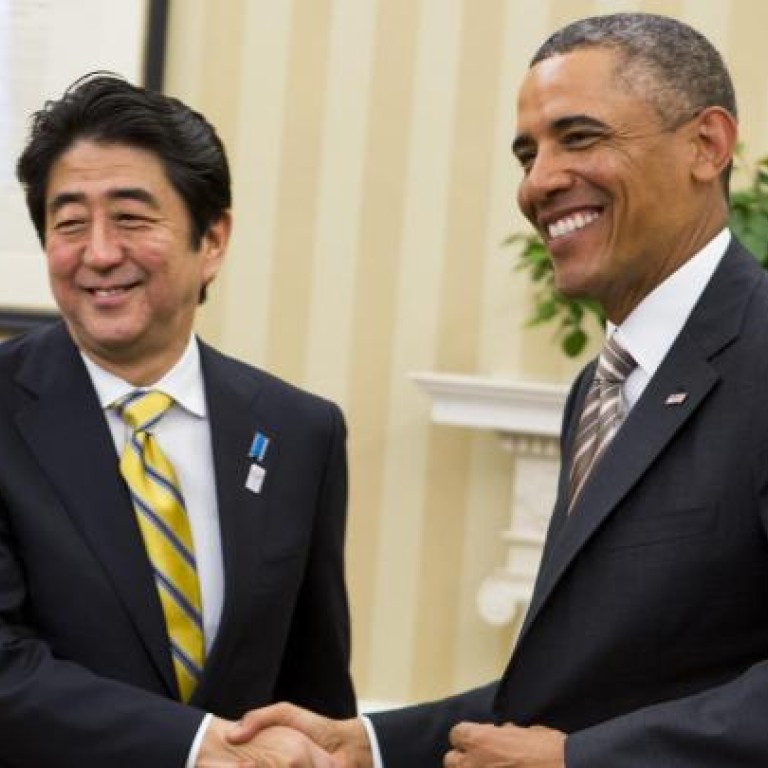
Japan's PM Shinzo Abe fails to win Obama's support in Diaoyus row
While Abe kept up his hardline comments about Japan's territorial dispute with China, he avoided disagreement with Obama during their talks on Friday. The Japanese leader declared that both nations would exert pressure on North Korea over its nuclear tests and continue talks about Japan's "possible interest" in joining a trade pact initiated by Washington.
Japanese Prime Minister Shinzo Abe failed to get US President Barack Obama to take a tough stand against Beijing during their meeting in Washington, to the relief of Chinese observers.
While Abe kept up his hardline comments about Japan's territorial dispute with China, he avoided disagreement with Obama during their talks on Friday. The Japanese leader declared that both nations would exert pressure on North Korea over its nuclear tests and continue talks about Japan's "possible interest" in joining a trade pact initiated by Washington.
While Obama told Abe, "You can rest assured that you will have a strong partner in the United States through your tenure", the president did not address the territorial dispute.
Jin Canrong , a professor of international relations at Renmin University, said the US backing of Abe was less enthusiastic than Tokyo had hoped.
"The outcome of the talks between Abe and Obama was vague without any concrete promises from Washington," Jin said.
US Secretary of State John Kerry, in a separate meeting with Japanese Foreign Minister Fumio Kishida, "complimented" Japan on its restraint amid the dispute over the Diaoyu Islands, known as the Senkakus in Japan.
Beijing was concerned Washington would support Abe's tough stance towards China, and his plan to boost Japan's defence capability, especially after the then secretary of state, Hillary Rodham Clinton, warned China not to challenge Japan's control of the islands a month ago.
But a commentary by Xinhua described Washington's response to Abe as "cold", and said that had prompted Abe to take a step back from his hawkish approach by stressing Japan would handle the dispute calmly.
"The Obama administration will not easily confront China just because of the dispute, which is not the core interest of the US," it said, adding Abe's administration would only "court a rebuff" if it relied on the US.
Ties between China and Japan have deteriorated since September, when the Japanese government announced it would buy three of the five uninhabited islands to thwart their purchase by the Tokyo municipal government of ultranationalist Shintaro Ishihara.
Tensions continued yesterday, with Tokyo saying a Chinese government ship briefly entered its territorial waters around the islands. Abe vowed he would not tolerate China's incursions.
"We simply cannot tolerate any challenge now and in the future," he said at the Centre for Strategic and International Studies after his meeting with Obama.
Professor Su Hao , of China Foreign Affairs University, said Abe wanted Obama's open support for Tokyo's stance in the dispute. "But Washington is concerned Tokyo would feel less restrained in such confrontations if it felt it had a strong backup," he said. "It is in the US interest that China and Tokyo are embroiled to some degree, but that tension has to be kept under control if the US is to exert its influence."
In their talks, Obama said he and Abe were united in their "determination to take strong action" after Pyongyang's third nuclear test this month, vowing to push for tougher sanctions.
Jin Canrong, of Renmin University, said co-operation on North Korea was the less "risky" pledge, as Washington would be seen as confronting Beijing, and other Asian countries, if it backed Tokyo in its territorial disputes.
"The US is in the lead position in the US-Japan alliance," he said. "If the Japanese military is strengthened, then Tokyo will rely less on Washington."
Professor Lian Degui , from the Shanghai Institutes for International Studies, expected Abe's tough rhetoric against Beijing to continue.

